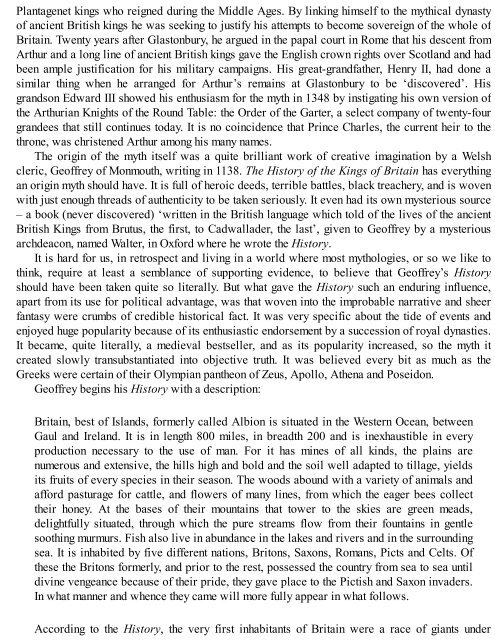You also want an ePaper? Increase the reach of your titles
YUMPU automatically turns print PDFs into web optimized ePapers that Google loves.
Plantagenet kings who reigned during the Middle Ages. By linking himself to the mythical dynasty<br />
of ancient British kings he was seeking to justify his attempts to become sovereign of the whole of<br />
Britain. Twenty years after Glastonbury, he argued in the papal court in Rome that his descent from<br />
Arthur and a long line of ancient British kings gave the English crown rights over Scotland and had<br />
been ample justification for his military campaigns. His great-grandfather, Henry II, had done a<br />
similar thing when he arranged for Arthur’s remains at Glastonbury to be ‘discovered’. His<br />
grandson Edward III showed his enthusiasm for the myth in 1348 by instigating his own version of<br />
the Arthurian Knights of the Round Table: the Order of the Garter, a select company of twenty-four<br />
grandees that still continues today. It is no coincidence that Prince Charles, the current heir to the<br />
throne, was christened Arthur among his many names.<br />
The origin of the myth itself was a quite brilliant work of creative imagination by a Welsh<br />
cleric, Geoffrey of Monmouth, writing in 1138. The History of the Kings of Britain has everything<br />
an origin myth should have. It is full of heroic deeds, terrible battles, black treachery, and is woven<br />
with just enough threads of authenticity to be taken seriously. It even had its own mysterious source<br />
– a book (never discovered) ‘written in the British language which told of the lives of the ancient<br />
British Kings from Brutus, the first, to Cadwallader, the last’, given to Geoffrey by a mysterious<br />
archdeacon, named Walter, in Oxford where he wrote the History.<br />
It is hard for us, in retrospect and living in a world where most mythologies, or so we like to<br />
think, require at least a semblance of supporting evidence, to believe that Geoffrey’s History<br />
should have been taken quite so literally. But what gave the History such an enduring influence,<br />
apart from its use for political advantage, was that woven into the improbable narrative and sheer<br />
fantasy were crumbs of credible historical fact. It was very specific about the tide of events and<br />
enjoyed huge popularity because of its enthusiastic endorsement by a succession of royal dynasties.<br />
It became, quite literally, a medieval bestseller, and as its popularity increased, so the myth it<br />
created slowly transubstantiated into objective truth. It was believed every bit as much as the<br />
Greeks were certain of their Olympian pantheon of Zeus, Apollo, Athena and Poseidon.<br />
Geoffrey begins his History with a description:<br />
Britain, best of Islands, formerly called Albion is situated in the Western Ocean, between<br />
Gaul and Ireland. It is in length 800 miles, in breadth 200 and is inexhaustible in every<br />
production necessary to the use of man. For it has mines of all kinds, the plains are<br />
numerous and extensive, the hills high and bold and the soil well adapted to tillage, yields<br />
its fruits of every species in their season. The woods abound with a variety of animals and<br />
afford pasturage for cattle, and flowers of many lines, from which the eager bees collect<br />
their honey. At the bases of their mountains that tower to the skies are green meads,<br />
delightfully situated, through which the pure streams flow from their fountains in gentle<br />
soothing murmurs. Fish also live in abundance in the lakes and rivers and in the surrounding<br />
sea. It is inhabited by five different nations, Britons, Saxons, Romans, Picts and Celts. Of<br />
these the Britons formerly, and prior to the rest, possessed the country from sea to sea until<br />
divine vengeance because of their pride, they gave place to the Pictish and Saxon invaders.<br />
In what manner and whence they came will more fully appear in what follows.<br />
According to the History, the very first inhabitants of Britain were a race of giants under
















